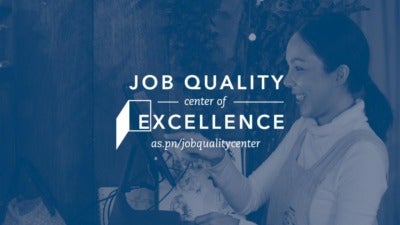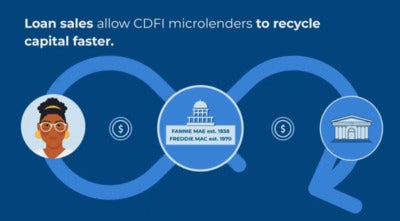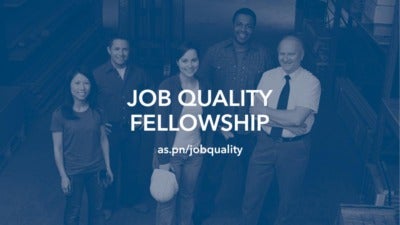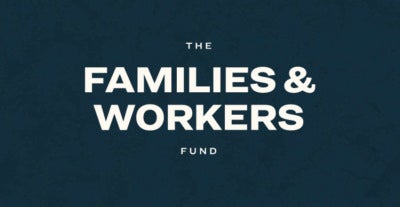At the Aspen Institute Economic Opportunities Program, and for our many colleagues and partners, the ongoing and intertwined health, economic, and racial justice crises bring new urgency to our work to improve access to quality jobs, options to participate in business ownership, and the freedom to pursue economic opportunity. Below we share our monthly newsletter with highlights of recent work. As always, we welcome your feedback, thoughts, and partnership in advancing inclusive opportunity and an economy in which we all can thrive. Click here to subscribe.
Click here to view past editions of our newsletter
News and Updates
 Announcing the Job Quality Center of Excellence
Announcing the Job Quality Center of Excellence
The US has a job quality crisis. Too many jobs are not quality jobs, and too many working people can’t afford a decent living for themselves and their families. The burdens of low-quality jobs are not evenly distributed, with women and workers of color most negatively impacted. In response, we offer the Job Quality Center of Excellence, a new platform that aims to drive improved job quality, equity, and economic dignity for workers through deep stakeholder engagement, idea generation, and resource sharing to help equip leaders across sectors and at all levels to act. At the Center, you’ll find exemplars, practical tools, inclusive conversations, and research and resources. The Center draws on the work of the Economic Opportunities Program and others who are innovating to improve job quality. Please turn to the Center as a resource and forum for sharing fresh approaches. Click here to visit.
Job Quality Fellowship: Webinar and Nominations
We are pleased to open our nomination process for a new cohort of Job Quality Fellows. Selected Fellows will participate in a year-long experience intended to engage Fellows in a process of peer learning and support, strengthen their capacities and expand their networks, and center the importance of job quality in our narratives about work. This class of Fellows will focus on the intersection between workforce development and worker organizing/advocacy. The Fellowship will select leaders of organizations working to improve the quality of jobs and who have an interest in helping workers to understand and defend their rights at work. Please consider nominating individuals who are innovative, forward-thinking, passionate about addressing the challenge of equity and inclusion in the US economy, and committed to improving the quality of jobs in the U.S. The nomination form is available here.
This afternoon, we hosted an informational webinar about the Job Quality Fellowship. We were pleased to welcome two Job Quality Fellows to this conversation—Amanda Cage, president and CEO of the National Fund for Workforce Solutions, and Jess Kutch, co-founder and co-executive director of Coworker.org—who discussed their efforts to advance job quality and their experience as members of the Fellowship. Click here to view or listen to the recording.
Hosting the Families and Workers Fund: Good Jobs Champions
The Families and Workers Fund recently announced a $25 million commitment to advance good jobs. Announced at the Department of Commerce’s Interagency Convening on Equitable Economic Growth, the funding will be used to make grants to nonprofit organizations advancing a more equitable workforce, quality jobs, and/or greater access to upwardly mobile career pathways; provide support to state and local pilots; build partnerships with businesses and investors also committed to advancing good jobs; and launch a new Good Jobs Champions group. The Good Jobs Champions group will be convened by the Aspen Institute Economic Opportunities Program, in partnership with the Families and Workers Fund, and with members from policy organizations, philanthropies, investors, employers, and the worker movement. Click here to learn more.
Scaling Lending to Entrepreneurs of Color: Part I – Core Operational Challenges
Because business ownership has been a means for many Americans to build wealth, providing loans and grants to entrepreneurs of color has been seen by many as an important way to address the racial wealth gap. Although successfully reaching excluded entrepreneurs will require practices and competencies that meet their specific contexts, the lessons we have learned and practices that have proven successful will apply to all entrepreneurs who face barriers in accessing credit because of low levels of wealth, thin or nonexistent credit files, differences in cultural experiences and languages, discrimination, and/or the amount of credit they are seeking. In a new brief, Business Ownership Initiative (BOI) Director Joyce Klein, Job Quality Fellow Eric Weaver, and BOI Senior Fellow Tim Ogden discuss the core operational challenges that community development financial institutions (CDFIs) face in scaling their lending to entrepreneurs of color. Click here to read the brief.
 Videos: Getting Capital to Small Businesses in Low-Income Communities
Videos: Getting Capital to Small Businesses in Low-Income Communities
In addition to the brief cited above, BOI released two short explainer videos on improving lending to entrepreneurs in low-income communities: Getting Capital to Small Businesses in Low-Income Communities and How Loans Sales Can Boost Lending to Low-Income Communities. In our first video, we identify the importance of microloans in meeting firms owned by people of color where they are in terms of their capital needs, and we highlight the work of CDFIs in serving this vital role. In our second video, we explain how creating a secondary market for small business loans can expand the capacity of CDFIs and give more entrepreneurs the support they need.
 Deadline Extended: Survey on Digital Skills and the Latino Workforce
Deadline Extended: Survey on Digital Skills and the Latino Workforce
The Aspen Institute’s Latinos and Society Program and UpSkill America initiative are partnering on a new project on digital skills and the Latino workforce. The Digital Skills and the Latino Workforce Survey—which is now open until Friday, December 10—aims to study how employers feel about the digital skill needs of their companies, the type of resources employers and workforce development organizations need to support digital skills development, and the types of programs employers and education and training providers are investing in for the Latino workforce. Click here to submit your response.
This work builds on UpSkill America’s year-long study to learn how the pandemic and heightened attention to racial inequities have influenced companies’ skill needs, hiring practices, education and training programs, diversity, equity and inclusion work, and worker supports.
 Shelly Steward Talks Women and Gig Work on Good Morning America
Shelly Steward Talks Women and Gig Work on Good Morning America
In her appearance on Good Morning America, Future of Work Initiative Director Shelly Steward explained that the shift for women into the gig economy is as much about opportunity as it is a reflection of what’s broken in the labor market. “I would shift the responsibility from working women and put it towards policymakers, business leaders, people in positions of power to change things,” notes Steward. “To recognize that we don’t have enough good jobs, and we don’t have enough jobs that allow people to balance different commitments in life, and we don’t have a basic care infrastructure that provides and values caretaking.” Watch her appearance and read the full story here.
Jenny Weissbourd Makes the Business Case for Job Quality at the Steamboat Springs Economic Summit and the Mid-America Restaurant Expo
Workforce Strategies Initiative Associate Director Jenny Weissbourd presented at the annual Steamboat Springs Economic Summit, hosted by the Chamber of Commerce and Economic Development Council in Steamboat Springs, Colorado. The session, “How the Changing Workforce is Changing the Workplace,” focused on how businesses can attract and retain talent by improving job stability. Jenny also spoke at the Mid-America Restaurant Expo on November 1. The Expo brought together over 4,000 experts and operators to discuss the latest trends and topics affecting the restaurant industry. Jenny joined Erin Patinkin, founder and CEO of Ovenly, and Emily Fabiano, founder and president of Workmorphis, for a discussion of the challenges facing US restaurant workers and the steps that employers and policymakers can take to strengthen job quality. Learn more.
Workforce Leadership Academy Fellows Build Strategies for Engaging Employers on Job Quality and Racial Equity
At their monthly working session, the Greater Phoenix Workforce Leadership Academy Fellows heard from Kimberly Shin (FSG/TalentWire) and Job Quality Fellow Liddy Romero (WorkLife Partnership) about practices, tools, and strategies to strengthen race equity and job quality among employers. They also heard from Jennifer Mellor (Greater Phoenix Chamber), Kaaren-Lyn Graves (Arizona Hispanic Chamber of Commerce —American Indian, Alaska Native, and Hawaiian Project), Bob Jackson (Achieve Pinal Board Member, former Mayor of Casa Grande), and Grace Heffernan, (Thomas P. Miller & Associates) on systems change approaches applicable in the private and public sectors. In addition, Fellows used the TalentRewire/Grads of Life Opportunity Navigator assessment to gain insights into their own organizations’ approaches to race equity and inclusion. Fellows are applying these insights while developing their collaborative projects (CoLabs) and will present their ideas for change to Phoenix workforce system stakeholders in early 2022. Learn more about the Academy.
Upcoming Events
EOP will continue to host virtual events and webinars this season. Join our mailing list and follow us on social media to learn when new opportunities are available.
Join the conversation
Follow EOP on social media to join the conversation!
-Workforce Strategies Initiative @AspenWorkforce
-Business Ownership Initiative @Aspen_BOI
-UpSkill America @upskillamerica
-Future of Work Initiative @AspenFutureWork
About EOP
The Aspen Institute Economic Opportunities Program (EOP) advances strategies, policies, and ideas to help low- and moderate-income people thrive in a changing economy. We recognize that race, gender, and place intersect with and intensify the challenge of economic inequality and we address these dynamics by advancing an inclusive vision of economic justice. For over 25 years, EOP has focused on expanding individuals’ opportunities to connect to quality work, start businesses, and build economic stability that provides the freedom to pursue opportunity. For more information, visit as.pn/eop.
EOP has several initiatives, including the Business Ownership Initiative, Workforce Strategies Initiative, UpSkill America, Good Companies/Good Jobs, and the Future of Work Initiative. In addition, across these approaches EOP hosts the Economic Opportunity Fellows Network and the Opportunity in America event series.
Thank you to our many partners and funders for supporting our efforts.
Support Our Work
We are committed to making our events and publications freely available to everyone who finds them useful. But if you find value in our work and are able to support it, please consider making a tax-deductible donation. Click here to learn more.
Keep in Touch
Click here to join our mailing list. For updates every day, follow us on social media.






